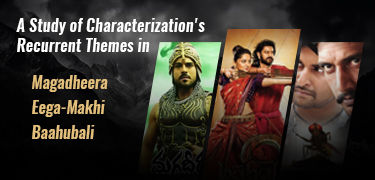A Study of Characterization's Recurrent Themes in Magadheera, Eega-Makhi, and Baahubali
This research delves into the captivating cinematic universe crafted by the esteemed Indian director SS Rajamouli, focusing on the recurrent themes of reincarnation and revenge as portrayed in three seminal films: Magadheera, Eega/Makhi, and Baahubali. The objective is to unravel the director's distinctive approach to storytelling and characterization, particularly when conveyed through different actors. Employing a qualitative methodology, the study employs film analysis, narrative scrutiny, and cultural context examination to dissect each film's treatment of reincarnation and revenge. This comprehensive study contributes to the understanding of SS Rajamouli's recurring themes, offering insights into the director's creative process, cultural motifs, and the dynamic interplay between cinematic storytelling and audience engagement.


The motivation underlying this qualitative research is a deep appreciation for the enthralling cinematic realm expertly forged by acclaimed Indian filmmaker SS Rajamouli. This study's primary objective is to unearth the complex layers of Rajamouli's narrative craft, with a particular emphasis on the interconnected themes of reincarnation and revenge as they manifest in three seminal films: Magadheera, Eega/Makhi, and Baahubali. By engaging in a thorough analysis of these films, this research seeks to illuminate Rajamouli's distinctive storytelling methods, as well as his nuanced approach to character development and portrayal.
At the heart of this exploration lies the desire to understand how Rajamouli's recurring thematic motifs are both interpreted and enacted by various actors, while also examining their resonance within diverse cultural contexts. Through an in-depth examination of each film's narrative structure, characterization, and thematic undercurrents, this study aims to provide a comprehensive understanding of Rajamouli's creative process and his unparalleled ability to engage audiences through powerful storytelling.
Moreover, this research recognizes the essential role that cultural motifs and mythological narratives play in shaping the themes of reincarnation and revenge in Rajamouli's oeuvre. By dissecting the intricate interplay between these elements and the overarching narratives, the study endeavors to contribute valuable insights into the thematic richness and enduring appeal of Rajamouli's films. This analysis will not only shed light on the filmmaker's thematic choices and their profound impact on Indian cinema but also further the ongoing discourse on the intersections between culture, myth, and cinematic storytelling.
In order to achieve these objectives, the research will employ a variety of methods, including film analysis, narrative scrutiny, and the examination of cultural motifs. By adopting a multifaceted approach, this study seeks to explore the diverse facets of Rajamouli's cinematic universe, uncovering the unique storytelling techniques that have made him one of the most influential filmmakers of his time. The insights gleaned from this analysis will not only contribute to a deeper understanding of his creative genius but also encourage scholarly discourse on the broader implications of his work for the landscape of Indian cinema.
In conclusion, the motivation behind this research stems from an admiration for SS Rajamouli's unparalleled cinematic vision and the desire to unravel the intricacies of his thematic choices, particularly in relation to reincarnation and revenge. Through a comprehensive analysis of his films and their cultural implications, this study aims to illuminate the genius of his storytelling craft and provide valuable insights into his enduring impact on Indian cinema, thereby enriching the broader conversation on the intersections between culture, myth, and cinematic narrative.


CATEGORIES
- MBA Program
- Data Science and Analytics
- Cloud Computing
- Data Analytics and Business Intelligence
- AI and Digital Systems
- Cyber Security and Digital Forensics
- Business Analytics & Intelligence
- Banking & Financial Services
- International Business
- Digital Marketing
- Research Paper
- Media & Entertainment
- Media Management
- Journalism and Media Production
- Media & Information Technology
- Visual Communication
- Game Development
- Sound Engineering
- Game Art & Design
- Photography
- Film Making
- Animation & VFX
Are you aspiring to become a proficient Media or Technology professional?
Look no further; we are committed to nurturing the potential of young minds. Are you ready to enhance your skills?


